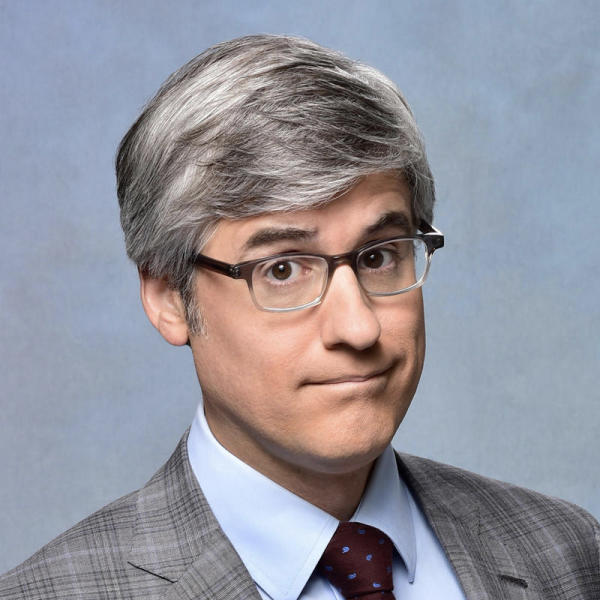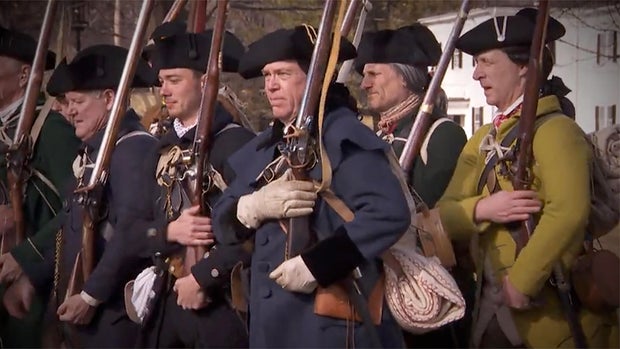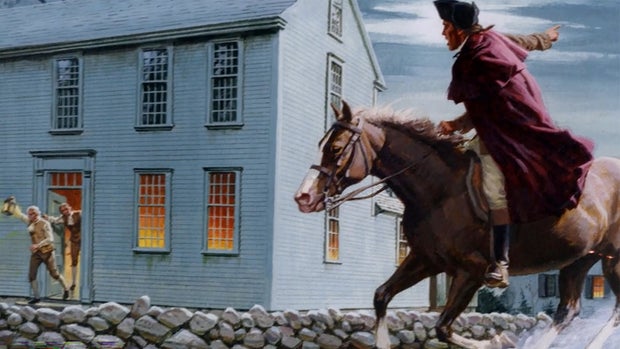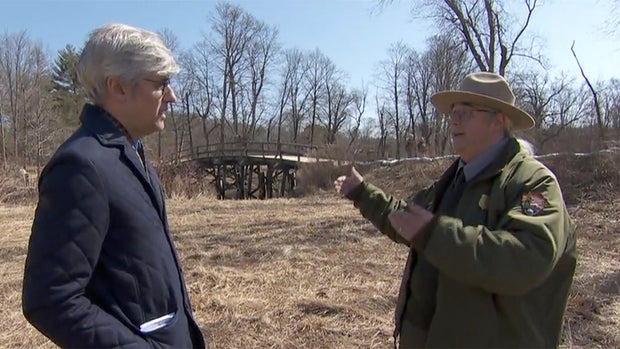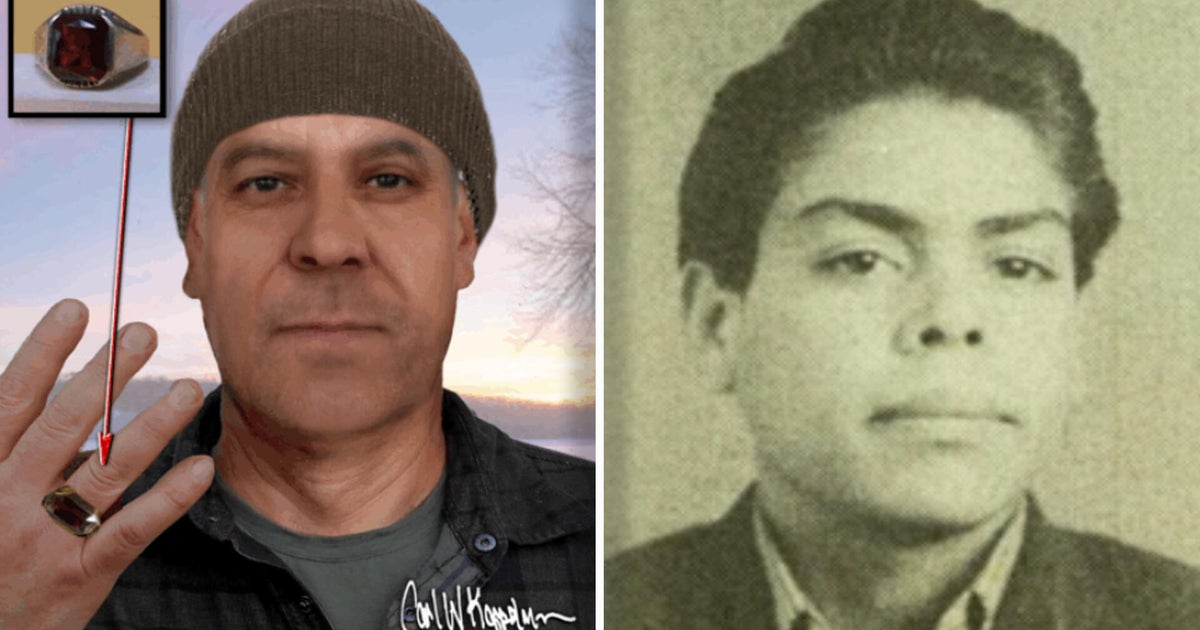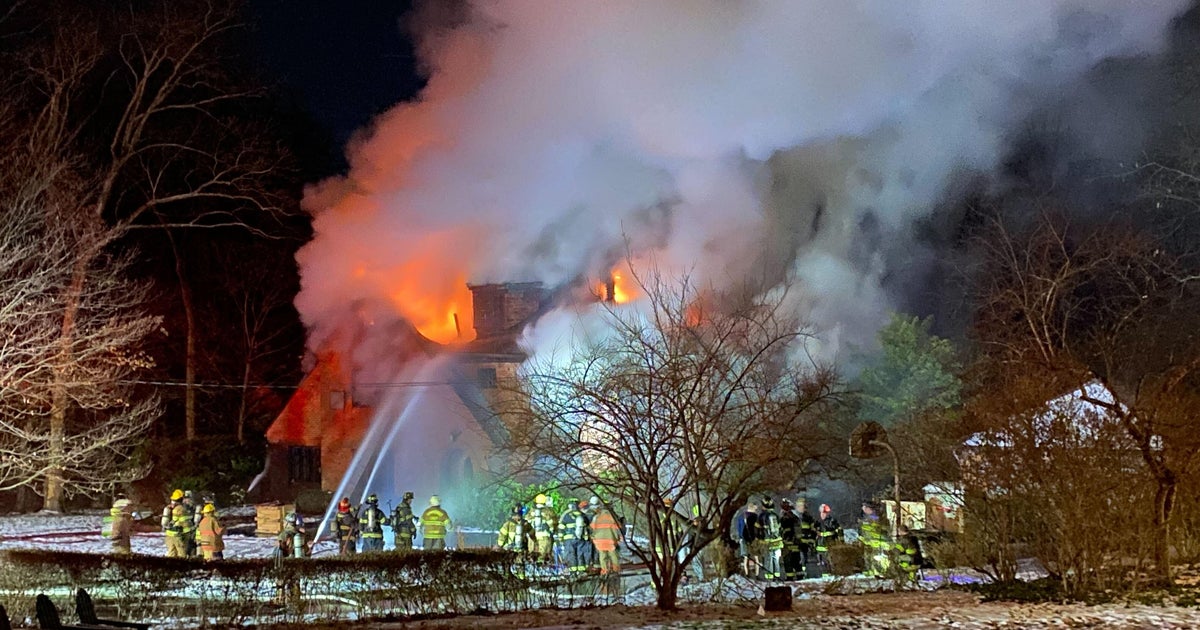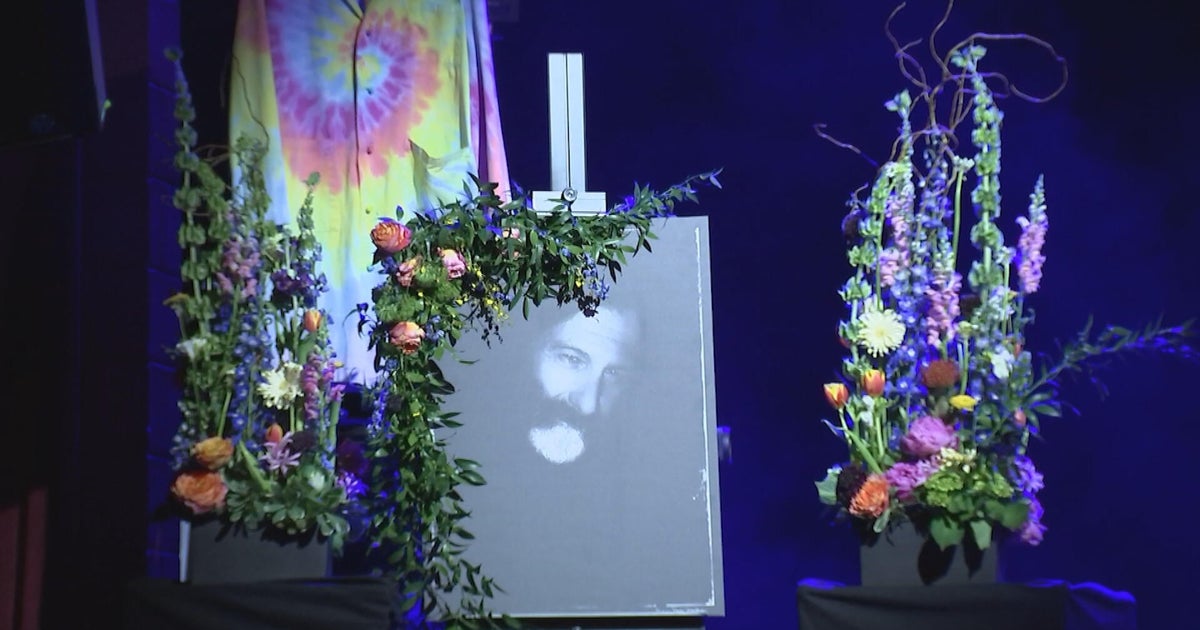The birth of the American Revolution
Newsreels told the story of World War II, and the early still photography of Matthew Brady chronicled the horrors of the Civil War. But with the American Revolution, which began 250 years ago this month, it can be harder to appreciate the life-and-death stakes in the colonists' fight for freedom. What did it feel like in Lexington and Concord, the two Massachusetts towns where, on one April day in 1775, the patriots and British redcoats first exchanged fire?
Larissa Sasgen, John Nichols and William Rose, members of the Lexington Minute Men reenactors group, have studied the period to understand what the mood was like among the colonists. "We discuss it a lot, we read accounts, we read diaries," said Sasgen.
"It's impossible for me, as someone who was born in the '80s, to ever imagine what it would have been like to have my freedoms taken as much as theirs were," said Nichols, "to be pushed into that proverbial corner where my only choice is to fight the world's best army."
"When we think about the revolution, most people they start with, you know, the taxes, the Stamp Act, the Townsend duties back in the 1760s," said Jim Hollister, a park ranger at Minute Man National Historical Park. "By the time you get to 1775, it's a whole different ball game."
By that point, the mother country and her Massachusetts colony were beyond estranged. Parliament had imposed onerous taxes without representation; sent thousands of British troops to occupy Boston; and - most egregiously - stripped Massachusetts of the power to govern itself, power it had enjoyed for nearly a century.
"What gets somebody living a comfortable life to then take the most dramatic action?" asked Hollister. It was, he said, because they felt humiliated – and threatened.
On April 18, 1775, seven hundred British soldiers began marching 18 miles through the night from Boston to Concord to seize arms that had been stockpiled by patriot militiamen.
Hollister said, "There's not supposed to be a Massachusetts army; that is treason" - punishable by death. "They are taking a huge risk."
About halfway between Boston and Concord: the town of Lexington, which happened to be where two future founding fathers, Sam Adams and John Hancock, were relying low. Hancock was one of the wealthiest men in the colonies, and a major financier of the patriot cause. Adams had helped plan the Boston Tea Party.
At about 11:30 p.m. that evening, Paul Revere rode into town, sounding the alarm about the approaching redcoats. According to the Lexington History Museums' Sarah McDonough, Revere made a special stop in Lexington, to urge Adams and Hancock to flee. "John was very hesitant to leave," she said. "There are men outside who are going to fight the might of the British empire; he wants to be a part of that. He sees himself as a leader, and he very much was. Sam Adams was said to have sort of placed his hand on John's shoulder and said, 'We don't belong here.'"
The two leaders escaped under cover of darkness, as 77 brave patriot militiamen stood, guns drawn, at sunrise on April 19, as the world's most vaunted army approached. It's not known who fired the first shot, but one thing is clear: It did not go well for the patriots. The colonists scattered, eight of them killed, a terrible toll for this tight-knit community. "All of these people were intimately connected, which makes the wave of grief that much worse because everyone lost someone," said McDonough.
Hollister said, "Now, word is radiating: They've killed our people in Lexington. So, the militiamen that are turning out after that are infuriated."
More than 400 Minute Men (called so because they were ready at a moment's notice) gathered later that morning to take on the redcoats as they arrived at Concord's North Bridge. "Then, a shot rings out, from the British side by all accounts, and then a second and a third," Hollister said. "And one of the Minute Men is grazed in the forehead. And then, Major Buttrick gives a fateful order: 'Fire, for God's sake, fire.' And that was the first time that a colonial officer ordered his Minute Men to fire on the King's soldiers.
"Once the Minute Men open fire, the casualties in the British are very heavy, and they just break and they run," said Hollister. "There's no turning back. And for the Minute Men, imagine seeing the backs of British soldiers running … from you!"
Throughout their grueling 18-mile retreat, the redcoats took fire from a growing number of colonial militiamen fighting from behind rocks and trees. This was terrain the patriots knew well. It was now the British suffering humiliation. By the time their day ended in Boston, more than 70 of them were dead and hundreds more injured.
What changed that day? "The idea that the crisis could be settled peacefully, the idea that they were going to be able to return to their normal lives," said Hollister. "The world that they knew was gone."
The following month, the Second Continental Congress convened in Philadelphia. There, delegates, including John Hancock and Sam Adams, appointed George Washington the commander of the newly-formed Continental Army. The Revolutionary War had begun.
And for reenactor William Rose, himself a military veteran, the story of that fateful April day will always be worth retelling: "Maybe no one will remember me 50 years from now, but if some kid remembers me because I gave him a great story that he can relate to? Think about the immigrants, 1607 Jamestown or 1620 Plymouth, or 20 minutes ago on the Southern border, or any place else: they're coming here for a reason, for the ability to not have somebody else have a boot on your neck. If we can get rid of all the nonsense, the red and the blue and the value judgments, and just look at that reason, that's what America stands for.
"And if I can convince one little kid that this is the place to keep striving for that," said Rose, "then that kid can be us dressed up in another 50 years."
For more info:
- Minute Man National Historical Park, Concord, Mass.
- The Lexington Minute Men
- Lexington History Museums
- Town of Lexington, Mass.
- Visit Concord, Mass.
Story produced by Mark Hudspeth. Editor: Carol Ross.
More revolutionary history from "Sunday Morning":
- The forgotten story of George Washington's love life
- "Mobituaries": Thomas Paine, the forgotten founding father
- Inside the Museum of the American Revolution
- George Washington's turbulent retirement
- What Colonial Williamsburg may teach us about politics today
- A monumental reckoning
- A friend of the American Revolution is reborn
- The Truth About George Washington
- George Washington slept here
- David McCullough on the life of patriot John Adams
